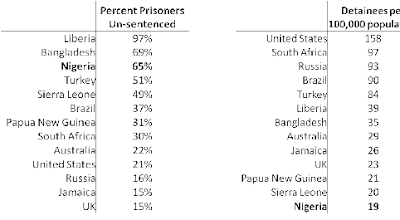The objective of the survey was to obtain information regarding the views of Nigerians on the proposed removal of fuel subsidy by the government in January 2012.
Methodology:
The opinion poll was conducted between October 31- November 4, 2011 via telephone interviews, with 1032 respondents. The respondents were Nigerians who are 18 years and above living in all parts of the country. The telephone numbers were randomly selected from a pool of numbers, with care to ensure that the six geo-political zones were represented. The survey was conducted in English, Pidgin, Hausa, Igbo and Yoruba
Awareness of the Planned Removal of Subsidy from Petrol
The survey showed that more than six in ten (66%) of the respondents were aware of the planned removal of subsidy on the price of petrol. More men (70%) than women (68%) were aware. With regards to awareness by region the south-west recorded the highest (76%)
Figure 1: Awareness of the Planned Subsidy Removal
Figure 2: Awareness by Gender

Figure 3: Awareness by Region
Support thePlanned Subsidy Removal
Slightly more than 8 out of every 10 respondents (87%) said they do not support removal of subsidy from the price of petrol. Only 13% said they support the removal.
Figure 4: Support for Planned Subsidy Removal
Figure 5: Awareness by Gender
Figure 6: Support by Region
Why do you support the removal?
Most of those who support subsidy removal said that subsidizing petrol prices is a waste of resources (33%) and the money should be used for infrastructural development. 17% of the respondent said the masses do no benefit from subsidy, rather only a few people do, while 13% said that the removal will encourage competition in the petroleum sector which will in the long run reduce the price of petrol.
S/N | Reasons for supporting removal | percentage |
1 | Waste of Resources | 33% |
2 | Money for Subsidy should be put to better use | 33% |
3 | The Masses do not benefit from Subsidy | 17% |
4 | Encourage competition in petroleum Sector | 13% |
Table 1: Reasons for supporting removal
The main reason cited against subsidy removal is the belief that it will lead to increase in price of goods and services (69%), while 11% of the respondent believed that the subsidy is the only benefit Nigerians (as an oil producing country) have enjoyed from the government, 9% said that petrol should be refined locally before subsidy removal be considered, therefore new refineries should be built first, existing ones be fixed and properly managed. While 7% of the respondents said government should create jobs first, while 4% of the respondents believed that government will mismanagement savings from subsidy removal through corrupt practices.
s/n | Reasons for not supporting removal | percentage |
1 | Cost of goods and Services more expensive | 69% |
2 | Only Benefit as an Oil producing country | 11% |
3 | Refineries Should be fixed/or built first | 9% |
4 | Jobs should be created first | 7% |
5 | Mismanagement of savings through corruption | 4% |
Table 2: Reasons for not supporting removal
What would Nigerians do if the Government goes ahead with the Planned Removal?
46% of respondents believe Nigerians would protest the removal of subsidy on petrol through public demonstrations and industrial actions/strikes (23%), while 26% believe Nigerians would accept the removal passively as the Nigerian people are generally peaceful and have seen/endured harsh actions taken by the government. 5% of the respondents believe that removal will be acceptable if Nigerians are convinced that the saved funds would be put to good use.
Figure 7: Expected Reactions of Nigerians to Subsidy removal?
How would you react personally to the removal?
38% of respondents said they would accept the removal passively, while 28% said they would reject through public demonstrations. 22% of the respondents said they will accept if convinced that the savings from removal is put to good use and 11% will reject removal through industrial actions.
Figure 8: Personal Reaction to Removal of Subsidy
Do you think that breakdown of law and order might occur as a result of fuel subsidy removal?
41% of the respondents believe that the removal could lead to breakdown of law and other; 42% do not believe, while 17% do not know/refused to answer.
Figure 9: Forecast of Nigerians Reaction to Subsidy Removal
Are security agencies well equipped to handle a breakdown of law and order?
When asked if they believed that the security agencies are able to handle the situation if there is a breakdown of law and order, 79% of the respondents said no, while 12% believed that security agencies are up to the task; while nearly 1 in 10 indicated they don't know/refused.
Figure 10: Assessment of readiness of security agencies to deal with law and order problems
Conclusion
· The Survey reveals a high level of awareness among respondents of the planned removal of subsidy on the price of petrol especially in the southwest region (76%).
· 87% do not support the removal majorly because of the belief that it will bring about more hardship on Nigerians especially in the cost of goods and services.
· Majority of the respondents think that Nigerians would protest the removal of subsidy on petrol through public demonstration and industrial actions.
· Should that happen, nearly 9-in-10 of respondents thinkssecurity agencies are not effectively equipped to handle the situation.
Recommendations
Government should:
• Drop the plan to remove fuel subsidy;
• Fight Corruption in NNPC and the oil industry;
• Stop illegal bunkering and theft of oil in the Niger Delta
• Use the savings to fix old refineries and build new ones.



















